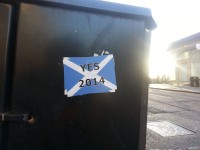By Sylvain Guiler
Many waves of nationalism have swept through Europe since the beginning of the 21st century. This trend is intensifying as Scotland will vote for its independence from the United Kingdom on Thursday.
This referendum was sought by the Scottish National Party, led by Alex Salmond. Salmond and British Prime Minister David Cameron agreed to hold a referendum on Scotland’s independence since the signing of the Edinburgh Treaty in 2012.
It is important to look back at Scotland’s history to understand why England’s northern neighbor is now facing a crucial decision for its future. The Kingdom of Scotland was a sovereign state from 843 to 1707. It then reunited with the Kingdom of England to form the Kingdom of Great Britain. Scotland has remained for long a member of the United Kingdom without elected officials until Tony Blair, former british prime minister born in Edinburgh, Scotland, signed into law the Scotland Act that created a Scottish Parliament in 1998. Seventy-four percent and 63 percent of Scottish citizens, respectively, supported the idea of a Scottish Parliament and tax-varying powers in a 1997 referendum. The Scottish National Party reached power in 2007. Four years later, it obtained the seat majority necessary to put forward its referendum promise.

(Photos courtesy of Wikimedia Commons)
All Scottish citizens above the age of 16, residents who are members of the European Union or Commonwealth, and British Armed Forces will be able to vote.
Scottish independence debates revolve around the strong Scottish national identity. However, three main issues can be identified: democracy and representation, economic power, and comprehensive national healthcare.
From a political standpoint, Scotland’s independence will represent the end of social and economic policies imposed on them by a distant British Parliament. In a country that generally favors the left side of the political spectrum, the Scottish have long been dissatisfied with Margaret Thatcher and today’s David Cameron politics of privatizations.
The SNP pinpoints Scotland’s independence as a cornerstone to engage a fully democratic process. Salmond said, “It is about the power to choose who we should be governed by and the power to build a country that reflects our priorities as a society and our values as a people.”

Many wonder whether Scotland will be better off economically as a separate national entity. Salmond strongly believes Scotland is one of the richest nations in the world. According to the U.K. Office for National Statistics, Scotland has the 15th highest gross national product per capita, ahead of the rest of the U.K. Today, the U.K. benefits from the oil revenue situated in Scotland. However, since the oil revenue greatly fluctuates throughout the year while the oil reserves continuously shrink, it would not constitute a viable economic model for the long-term. The SNP asserts that the country can also rely on its tourism, whisky, and expandable renewable energy revenues.
Aside from that, Salmond claims that Scotland will keep the pound as its currency if it becomes independent. But, George Osbourne, chancellor of the Exchequer, repeatedly has opposed this scenario. Even though the Scottish and British economies are now equivalent, the Scottish economy would be more unstable because of its oil revenue dependency.
Scotland may also be tempted to create its own currency. It would then be able to set its exchange rate freely without the Bank of England. But, this alternative frightens analysts and corporations since the country would have to cut public spending and increase taxes to accumulate enough cash reserves. Adopting the euro is another option that the SNP often discards because of its stringent monetary policies, implications on the Scottish economy.
Of all the issues dealing with the referendum, debate over the National Health Service, founded in 1948 by the Labour Party, may be one of the most disputed. According to BBC, the NHS is the fifth largest employer in the world, following McDonald’s with 1.7 million employees. The publicly funded healthcare system provides free comprehensible care to U.K. residents. The NHS strongly defends this British exception while criticizing London for encouraging more privatization of the healthcare industry. Alistair Darling, former chancellor of the Labour Party, is not in favor of Scotland’s independence and asserts that “funding for the service was due to rise,” according to Yahoo!
A couple of hours before the beginning of the vote, the outcome of the referendum is highly unpredictable. Some polls recently credited the “Yes” with a slim majority, but The Guardian and other newspapers claim the contrary. While Cameron is campaigning for the “No” along with his Conservative Party and the Liberal Democrats, many celebrities have expressed themselves on the question in the media. Scottish band Franz Ferdinand organized a “Yes Scotland” concert supported by Morrissey and Sir Sean Connery, while Paul McCartney, David Bowie, and Sir Alex Ferguson called for the Scottish “to all stand together.”
Apart from its unpredictable fate on Thursday, Scotland’s strong national identity does not necessarily support independence from the U.K. A majority of Scottish citizens supported the Scotland Act 2012 which bestows further powers (increased legislative control and tax powers from 2015) to the Scottish Parliament. This alternative may constitute a good compromise between the leaders of the NSA and other main British political parties. Instead of seceding like Montenegro from Serbia in 2006, Scotland would then adopt a similar position to Quebec which chose to stay united with Canada.






